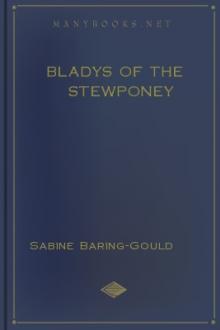The Book of Were-Wolves - Sabine Baring-Gould (best selling autobiographies .txt) 📗

- Author: Sabine Baring-Gould
Book online «The Book of Were-Wolves - Sabine Baring-Gould (best selling autobiographies .txt) 📗». Author Sabine Baring-Gould
CONTENTS
CHAPTER I
INTRODUCTORY
CHAPTER II
LYCANTHROPY AMONG THE ANCIENTS
Definition of Lycanthropy--Marcellus Sidetes--Virgil--Herodotus--Ovid--Pliny--Agriopas--Story from
Petronius--Arcadian Legends--Explanation offered
CHAPTER III
THE WERE-WOLF IN THE NORTH
Norse Traditions--Manner in which the Change was effected--Vlundar
Kvda--Instances from the Völsung Saga--Hrolf's Saga--Kraka--Faroëse
Poem--Helga Kvida--Vatnsdæla Saga--Eyrbyggja Saga
CHAPTER IV
THE ORIGIN OF THE SCANDINAVIAN WERE-WOLF
Advantage of the Study of Norse Literature--Bear and Wolf-skin
Dresses--The Berserkir--Their Rage--The Story of Thorir--Passages from
the Aigla--The Evening Wolf--Skallagrim and his Son-Derivation of the
Word "Hamr:" of "Vargr"--Laws affecting Outlaws--"To become a
Boar"--Recapitulation
CHAPTER V
THE WERE-WOLF IN THE MIDDLE AGES
Stories from Olaus Magnus of Livonian Were-wolves--Story from Bishop
Majolus--Story of Albertus Pericofcius--Similar occurrence at
Prague--Saint Patrick--Strange incident related by John of
Nüremberg--Bisclaveret--Courland Were-wolves--Pierre Vidal--Pavian
Lycanthropist--Bodin's Stories--Forestus' Account of a
Lycanthropist--Neapolitan Were-wolf
CHAPTER VI
A CHAPTER OF HORRORS
Pierre Bourgot and Michel Verdung--'Me Hermit of S. Bonnot--The
Gandillon Family--Thievenne Paget--The Tailor of Châlons--Roulet 69
Chapter VII
JEAN GRENIER
On the Sand-dunes--A Wolf attacks Marguerite Poirier--Jean Grenier
brought to Trial--His Confessions--Charges of Cannibalism proved--His
Sentence--Behaviour in the Monastery--Visit of Del'ancre 85
CHAPTER VIII
FOLK-LORE RELATING TO WERE-WOLVES
Barrenness of English Folk-lore--Devonshire Traditions--Derivation of
Were-wolf--Cannibalism in Scotland--The Angus Robber--The Carle of
Perth--French Superstitions--Norwegian Traditions--Danish Tales of
Were-wolves--Holstein Stories--The Werewolf in the Netherlands--Among
the Greeks; the Serbs; the White Russians; the Poles; the Russians--A
Russian Receipt for becoming a Were-wolf--The Bohemian
Vlkodlak--Armenian Story--Indian Tales--Abyssinian Budas--American
Transformation Tales--A Slovakian Household Tale--Similar Greek,
Béarnais, and Icelandic Tales
CHAPTER IX
NATURAL CAUSES OF LYCANTHROPY
Innate Cruelty--Its Three Forms--Dumollard--Andreas Bichel--A Dutch
Priest--Other instances of Inherent Cruelty--Cruelty united to
Refinement--A Hungarian Bather in Blood--Suddenness with which the
Passion is developed--Cannibalism; in pregnant Women; in
Maniacs--Hallucination; how Produced--Salves--The Story of
Lucius--Self-deception 130
CHAPTER X
MYTHOLOGICAL ORIGIN OF THE WERE-WOLF MYTH
Metempsychosis--Sympathy between Men and Beasts--Finnbog and the
Bear--Osage and the Beaver--The Connexion of Soul and
Body--Buddism--Case of Mr. Holloway--Popular ideas concerning the
Body--The derivation of the German Leichnam--Feather
Dresses--Transmigration of Souls--A Basque Story--Story from the
Pantschatantra--Savage ideas regarding Natural Phenomena--Thunder,
Lightning, and Cloud--The origin of the Dragon--John of Bromton's
Dragon a Waterspout--The Legend of Typhoeus--Allegorizing of the
Effects of a Hurricane--Anthropomorphosis--The Cirrus Cloud, a
Heavenly Swan--Urvaci--The Storm-cloud a Daemon--Vritra and
Rakschasas--Story of a Brahmin and a Rakschasas
CHAPTER XI
THE MARÉCHAL DE REZT I: THE INVESTIGATION OF CHARGES
Introduction--History of Gilles de Laval--The Castle of
Machecoul--Surrender of the Marshal--Examination of Witnesses--Letter
of De Retz--The Duke of Brittany reluctant to move--The Bishop of
Nantes
CHAPTER XII
THE MARÉCHAL DE REZT II: THE TRIAL
The Appearance of the Marshal--Pierre de l'Hospital--The
Requisition--The Trial adjourned--Meeting of the Marshal and his
Servants--The Confession of Henriet--Pontou persuaded to confess
all--The adjourned Trial not hurried on--The hesitation of the Duke of
Brittany
CHAPTER XIII
MARÉCHAL DE RETZ III: THE SENTENCE AND EXECUTION
The adjourned Trial--The Marshal Confesses--The Case handed over to
the Ecclesiastical Tribunal--Prompt steps taken by the Bishop--The
Sentence--Ratified by the Secular Court--The Execution
CHAPTER XIV
A GALICIAN WERE-WOLF
The Inhabitants of Austrian Galicia--The Hamlet of Polomyja--Summer
Evening in the Forest--The Beggar Swiatek--A Girl disappears--A
School-boy vanishes--A Servant-girl lost--Another Boy carried of--The
Discovery made by the Publican of Polomyja--Swiatek locked up--Brought
to Dabkow--Commits suicide
Chapter XV
ANOMALOUS CASE--THE HUMAN HYENA
Ghouls--Story from Fornari--Quotation from Apuleius--Incident
mentioned by Marcassus--Cemeteries of Paris violated--Discovery of
Violator--Confession of M. Bertrand
CHAPTER XVI
A SERMON ON WERE-WOLVES
The Discourses of Dr. Johann--The Sermon--Remarks
CHAPTER I.
INTRODUCTORY.
I shall never forget the walk I took one night in Vienne, after having accomplished the examination of an unknown Druidical relic, the Pierre labie, at La Rondelle, near Champigni. I had learned of the existence of this cromlech only on my arrival at Champigni in the afternoon, and I had started to visit the curiosity without calculating the time it would take me to reach it and to return. Suffice it to say that I discovered the venerable pile of grey stones as the sun set, and that I expended the last lights of evening in planning and sketching. I then turned my face homeward. My walk of about ten miles had wearied me, coming at the end of a long day's posting, and I had lamed myself in scrambling over some stones to the Gaulish relic.
A small hamlet was at no great distance, and I betook myself thither, in the hopes of hiring a trap to convey me to the posthouse, but I was disappointed. Few in the place could speak French, and the priest, when I applied to him, assured me that he believed there was no better conveyance in the place than a common charrue with its solid wooden wheels; nor was a riding horse to be procured. The good man offered to house me for the night; but I was obliged to decline, as my family intended starting early on the following morning.
Out spake then the mayor--"Monsieur can never go back to-night across the flats, because of the--the--" and his voice dropped; "the loups-garoux."
"He says that he must return!" replied the priest in patois. "But who will go with him?"
"Ah, ha,! M. le Curé. It is all very well for one of us to accompany him, but think of the coming back alone!"
"Then two must go with him," said the priest, and you can take care of each other as you return."
"Picou tells me that he saw the were-wolf only this day se'nnight," said a peasant; "he was down by the hedge of his buckwheat field, and the sun had set, and he was thinking of coming home, when he heard a rustle on the far side of the hedge. He looked over, and there stood the wolf as big as a calf against the horizon, its tongue out, and its eyes glaring like marsh-fires. Mon Dieu! catch me going over the marais to-night. Why, what could two men do if they were attacked by that wolf-fiend?"
"It is tempting Providence," said one of the elders of the village;" no man must expect the help of God if he throws himself wilfully in the way of danger. Is it not so, M. le Curé? I heard you say as much from the pulpit on the first Sunday in Lent, preaching from the Gospel."
"That is true," observed several, shaking their heads.
"His tongue hanging out, and his eyes glaring like marsh-fires!" said the confidant of Picou.
"Mon Dieu! if I met the monster, I should run," quoth another.
"I quite believe you, Cortrez; I can answer for it that you would," said the mayor.
"As big as a calf," threw in Picou's friend.
"If the loup-garou were _only_ a natural wolf, why then, you see"--the mayor cleared his throat--"you see we should think nothing of it; but, M. le Curé, it is a fiend, a worse than fiend, a man-fiend,--a worse than man-fiend, a man-wolf-fiend."
"But what is the young monsieur to do?" asked the priest, looking from one to another.
"Never mind," said I, who had been quietly listening to their patois, which I understood. "Never mind; I will walk back by myself, and if I meet the loup-garou I will crop his ears and tail, and send them to M. le Maire with my compliments."
A sigh of relief from the assembly, as they found themselves clear of the difficulty.
"Il est Anglais," said the mayor, shaking his head, as though he meant that an Englishman might face the devil with impunity.
A melancholy flat was the marais, looking desolate enough by day, but now, in the gloaming, tenfold as desolate. The sky was perfectly clear, and of a soft, blue-grey tinge; illumined by the new moon, a curve of light approaching its western bed. To the horizon reached a fen, blacked with pools of stagnant water, from which the frogs kept up an incessant trill through the summer night. Heath and fern covered the ground, but near the water grew dense masses of flag and bulrush, amongst which the light wind sighed wearily. Here and there stood a sandy knoll, capped with firs, looking like black splashes against the grey sky; not a sign of habitation anywhere; the only trace of men being the white, straight road extending for miles across the fen.
That this district harboured wolves is not improbable, and I confess that I armed myself with a strong stick at the first clump of trees through which the road dived.
This was my first introduction to were-wolves, and the circumstance of finding the superstition still so prevalent, first gave me the idea of investigating the history and the habits of these mythical creatures.
I must acknowledge that I have been quite unsuccessful in obtaining a specimen of the animal, but I have found its traces in all directions. And just as the palæontologist has constructed the labyrinthodon out of its foot-prints in marl, and one splinter of bone, so may this monograph be complete and accurate, although I have no chained were-wolf before me which I may sketch and describe from the life.
The traces left are indeed numerous enough, and though perhaps like the dodo or the dinormis, the werewolf may have become extinct in our age, yet he has left his stamp on classic antiquity, he has trodden deep in Northern snows. has ridden rough-shod over the mediævals, and has howled amongst Oriental sepulchres. He belonged to a bad breed, and we are quite content to be freed from him and his kindred, the vampire and the ghoul. Yet who knows! We may be a little too hasty in concluding that he is extinct. He may still prowl in Abyssinian forests, range still over Asiatic steppes, and be found howling dismally in some padded room of a Hanwell or a Bedlam.
In the following pages I design to investigate the notices of were-wolves to be found in the ancient writers of classic antiquity, those contained in the Northern Sagas, and, lastly, the numerous details afforded by the mediæval authors. In connection with this I shall give a sketch of modern folklore relating to Lycanthropy.
It will then be seen that under the veil of mythology lies a solid reality, that a floating superstition holds in solution a positive truth.
This I shall show to be an innate craving for blood implanted in certain natures, restrained under ordinary circumstances, but breaking forth occasionally, accompanied with hallucination, leading in most cases to cannibalism. I shall then give instances of persons thus afflicted, who were believed by others, and who believed themselves, to be transformed into beasts, and who, in the paroxysms of their madness, committed numerous murders, and devoured their victims.
I shall next give instances of persons suffering from the same passion for blood, who murdered for the mere gratification of their natural cruelty, but who were not subject to hallucinations, nor were addicted to cannibalism.
I shall also give instances of persons filled with the same propensities who murdered and ate their victims, but who were perfectly free from hallucination.
CHAPTER II.
LYCANTHROPY AMONG THE ANCIENTS.
What is Lycanthropy? The change of manor woman into the form of a wolf, either through magical means, so as to enable him or her to gratify the taste for





Comments (0)